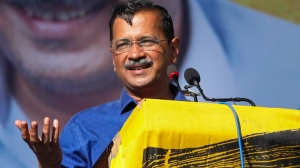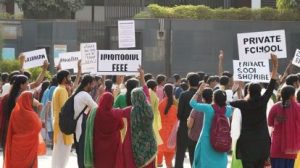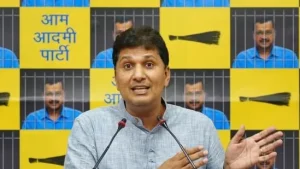New Delhi – In a significant development that has reignited the political debate over educational governance in the national capital, former Delhi Chief Minister and Aam Aadmi Party (AAP) national convener Arvind Kejriwal has made serious allegations about the current state of education in Delhi. Kejriwal has claimed that under the Bharatiya Janata Party (BJP) government, the Delhi education crisis has worsened dramatically, with the system falling “completely into the clutches” of education mafias. These strong statements come in the wake of reported fee hikes across several private schools in the capital, which have sparked protests among parents and students alike.
Kejriwal Sounds Alarm on Delhi Education Crisis

Taking to the social media platform X (formerly Twitter), the former Delhi Chief Minister expressed his concerns about what he perceives as a deteriorating situation in the capital’s education sector. Arvind Kejriwal’s comments directly address the ongoing Delhi education crisis, framing it as a regression to problems that his government had previously worked to solve.
“The people of Delhi are once again completely at the mercy of the education mafia,” Kejriwal stated in his post. His choice of words reflects the gravity with which he views the current Delhi education crisis, particularly the alleged influence of what he terms the “education mafia” over the system.
The AAP leader further questioned, “How dare the education mafia mistreat our children?” before providing his own answer: “Because the leaders and ministers are in their pockets — just like they used to be before our government came to power.” This accusation suggests that Kejriwal believes the current Delhi education crisis is not merely a matter of policy differences but involves deeper issues of governance integrity and regulatory capture.
Fee Hikes Trigger Protests Across Delhi Schools


At the heart of the current Delhi education crisis are reports of substantial fee increases across numerous private educational institutions in the capital. These hikes have not gone unchallenged, with parents and students organizing protests to express their discontent with what many consider unreasonable financial burdens.
The timing of these fee increases has become a central aspect of the Delhi education crisis, coming as they do after a change in the governing administration. Critics, including AAP leaders, have suggested that the fee hikes represent a systemic shift in how education is regulated in the capital following the transition of power.
The protests highlight the real-world impact of the Delhi education crisis on Delhi residents, many of whom are struggling to adapt to these unexpected financial pressures. Parent associations across Delhi have reported that some schools have increased fees by percentages that far outstrip inflation rates or improvements in educational services offered.
AAP’s Track Record on Education Reform
To understand the full context of Kejriwal’s statements about the Delhi education crisis, it’s essential to consider the AAP government’s previous policies regarding education in Delhi. During Kejriwal’s tenure as Chief Minister, education was positioned as a flagship priority, with the government implementing a series of reforms aimed at transforming public education in the capital.
The AAP government allocated approximately 25% of Delhi’s budget to education, substantially higher than the national average. This funding was directed toward infrastructure improvements, teacher training programs, and curriculum reforms. The government also established School Management Committees (SMCs) to increase parent participation in school governance, a move that was seen as reducing the influence of what Kejriwal now terms the “education mafia” in the current Delhi education crisis.
One of the most notable policies of the Kejriwal administration was the regulation of private school fee hikes. The government implemented measures requiring private schools built on public land to seek government approval before increasing fees, a policy that AAP claims helped keep education affordable for Delhi’s middle and lower-middle-class families. The apparent reversal or weakening of these regulations appears to be a central concern in what Kejriwal now describes as the Delhi education crisis.
Saurabh Bharadwaj Intensifies Political Battle


Adding fuel to the political fire surrounding the Delhi education crisis, AAP’s Delhi State President Saurabh Bharadwaj has launched a scathing attack on the BJP government. According to reports, Bharadwaj claimed that ministers in the ruling party “have no clue of the situation unfolding in Delhi,” suggesting a disconnect between governance and ground realities in the Delhi education crisis.
Bharadwaj’s comments complement Kejriwal’s narrative about the Delhi education crisis, positioning the AAP as defenders of accessible education against what they characterize as an indifferent or complicit BJP administration. This framing presents the current Delhi education crisis not merely as a series of unfortunate developments but as the direct result of policy choices and governance priorities.
The AAP leader’s assertion that BJP ministers are unaware of the severity of the Delhi education crisis serves a dual political purpose: it questions the competence of the current administration while simultaneously positioning the AAP as more attuned to the concerns of ordinary Delhi residents.
Regulatory Framework and Private School Governance
A critical aspect of the Delhi education crisis involves the regulatory framework governing private educational institutions in Delhi. Under Indian law, particularly the Delhi School Education Act and Rules (DSEAR), private schools are subject to certain regulations regarding fee structures and increases. However, the interpretation and enforcement of these regulations have been points of contention throughout Delhi’s educational governance history.
During the AAP government’s tenure, the administration had taken a relatively strict stance on fee regulation, particularly for schools operating on land provided by the Delhi Development Authority (DDA) at concessional rates. These schools were required to justify fee increases and obtain approval from the Directorate of Education. The current Delhi education crisis, according to AAP leaders, stems from a relaxation of this regulatory oversight.
The complexity of the Delhi education crisis is further compounded by the unique administrative structure of the national capital territory, where certain powers are divided between the elected government and the Lieutenant Governor, who represents the central government. This division has historically created friction in educational governance, contributing to the current Delhi education crisis.
Impact on Families and Educational Accessibility
Beyond the political dimensions, the Delhi education crisis has real implications for thousands of families across the capital. Education represents a significant portion of household expenditure for middle-class families in Delhi, with private school fees often consuming 20-30% of monthly incomes. Unexpected fee hikes can therefore create substantial financial pressure on families already dealing with inflation and economic uncertainties.
The Delhi education crisis is particularly acute for families who had made educational choices based on certain financial assumptions, only to find themselves facing unforeseen fee increases. Parents’ associations have reported cases where annual fee hikes have exceeded 15-20%, far outpacing average salary increments or inflation rates.
This aspect of the Delhi education crisis touches on broader questions of educational accessibility and equity. While private schools argue that fee increases are necessary to maintain quality and meet rising operational costs, critics contend that unregulated hikes can effectively exclude less affluent segments of society from quality education, exacerbating educational inequality in the capital.
Historical Context of Educational Reforms in Delhi
To fully comprehend the current Delhi education crisis, it’s valuable to consider the historical context of educational reforms in the capital. Delhi’s education system has undergone several transformations over the decades, with each administration bringing its own approach to balancing quality, accessibility, and regulatory oversight.
Prior to the AAP government, Delhi’s education system had been criticized for infrastructure deficiencies, teacher shortages, and significant disparities between government and private institutions. The AAP administration’s focus on education was positioned as a corrective to these historical challenges, with investments in school infrastructure, teacher training, and innovative programs like “Happiness Curriculum” and “Entrepreneurship Mindset Curriculum.”
The current Delhi education crisis, as framed by Kejriwal and other AAP leaders, represents a regression to pre-reform problems, with the added complication of what they characterize as regulatory capture by profit-oriented private school operators. This historical framing adds emotional and political weight to the current debate surrounding the Delhi education crisis.
BJP’s Response to Allegations
While the news input doesn’t include the BJP’s response to Kejriwal’s allegations about the Delhi education crisis, it’s important to note that such political accusations typically elicit counterarguments from the targeted party. The BJP has historically defended its educational policies at both the national and local levels, emphasizing initiatives like the National Education Policy 2020.
In previous instances of political criticism from AAP, the BJP has responded by highlighting what it considers achievements in educational governance and questioning the AAP’s own record. In the context of the current Delhi education crisis, the BJP would likely point to factors beyond government control that influence private school fee structures, such as inflationary pressures and increased operational costs.
The Delhi education crisis thus becomes another battleground in the ongoing political contest between AAP and BJP, with each side presenting contrasting narratives about educational governance, regulatory approaches, and their respective commitments to the welfare of Delhi’s students and families.
Legal Framework and Judicial Interventions
The Delhi education crisis doesn’t exist in a legal vacuum, as the regulation of private schools has been the subject of numerous court cases and judicial interventions over the years. The Delhi High Court has previously ruled on cases related to fee hikes, often attempting to balance the autonomy of private educational institutions with the need to protect students and parents from arbitrary or excessive fee increases.
Landmark judgments like Modern School vs. Union of India (2004) established principles for fee regulation, including the requirement that schools should not engage in profiteering and should operate with transparency in their financial affairs. These judicial precedents form an important backdrop to the current Delhi education crisis, as they define the legal parameters within which both schools and regulatory authorities must operate.
The Delhi education crisis may well lead to fresh litigation, as parents’ associations and advocacy groups could approach the courts seeking intervention against what they perceive as unjustified fee hikes. The courts’ response to such petitions would add another dimension to the evolving narrative of the Delhi education crisis in Delhi.
Comparative Perspective: Education Regulation Across States
To contextualize the Delhi education crisis, it’s instructive to consider how private school regulation is handled in other Indian states. Different states have adopted varying approaches to balancing educational autonomy with affordability and accessibility concerns.
States like Tamil Nadu and Maharashtra have established fee regulation committees that review and approve fee structures for private schools, while others like Gujarat have enacted specific legislation to control fee hikes. These diverse regulatory frameworks provide points of comparison for evaluating Delhi’s approach to private school governance amid the current Delhi education crisis.
The Delhi education crisis thus reflects broader national debates about the appropriate level of government intervention in private education, the balance between market forces and regulatory oversight, and the fundamental question of whether education should be primarily viewed as a public good or a market service.
Parents’ Associations and Civil Society Response
An important aspect of the Delhi education crisis is the response from parents’ associations and civil society organizations. These groups often serve as important advocates for educational accountability and have historically played a significant role in shaping educational policy in Delhi through advocacy, awareness campaigns, and legal interventions.
In the context of the current Delhi education crisis, parents’ associations across Delhi have organized protests and petitioned authorities to intervene against what they consider unjustified fee hikes. These grassroots actions represent an important dimension of democratic engagement with educational governance, highlighting the role of civil society in addressing regulatory failures or policy shortcomings.
The Delhi education crisis has galvanized these groups into coordinated action, with some forming larger coalitions to amplify their voice in the ongoing debate about private school regulation in the capital. Their perspective adds an essential non-partisan dimension to the discourse surrounding the Delhi education crisis.
Economic Dimensions of the Education Crisis
Beyond its political and regulatory aspects, the Delhi education crisis has significant economic dimensions. Education represents both a substantial household expenditure and a crucial investment in future earnings potential and social mobility. Unexpected increases in educational costs can therefore have ripple effects across family finances and long-term economic planning.
The Delhi education crisis comes at a time when many families are still recovering from the economic impacts of the COVID-19 pandemic, which included job losses, reduced incomes, and depleted savings. In this context, substantial fee hikes can create genuine hardship and force difficult choices between educational quality and other essential needs.
From a macroeconomic perspective, the Delhi education crisis touches on broader questions about the structure of educational financing in India, the role of private capital in educational provision, and the long-term sustainability of current models for funding quality education. These economic considerations add complexity to the political and regulatory debates surrounding the Delhi education crisis.
Future Implications for Delhi’s Educational Landscape
Looking forward, the Delhi education crisis could have lasting implications for the capital’s educational landscape. Political contests over educational governance often lead to policy oscillations as administrations change, creating uncertainty for schools, teachers, students, and families.
The Delhi education crisis may influence future electoral politics in Delhi, where education has emerged as a significant policy domain and voting issue. AAP had previously positioned its educational reforms as a key achievement, and the current accusations about regulatory capture and fee hikes could become central to political messaging in upcoming electoral contests.
Beyond electoral considerations, the Delhi education crisis raises fundamental questions about the sustainability of Delhi’s mixed public-private educational ecosystem and the appropriate balance between market autonomy and regulatory oversight. How these questions are resolved will shape educational opportunities and outcomes for the next generation of Delhi’s students.
Final Remarks: Navigating Complex Educational Challenges
The Delhi education crisis, as articulated by former Chief Minister Arvind Kejriwal and other AAP leaders, represents more than just a political dispute over fee regulation. It reflects deeper tensions in India’s educational landscape: between quality and accessibility, between institutional autonomy and public accountability, and between market mechanisms and regulatory frameworks.
Kejriwal’s accusation in this Delhi education crisis is that, the education system has “fallen into the clutches” of mafias under the BJP government frames the Delhi education crisis in stark terms, suggesting a fundamental breakdown in governance rather than merely a policy disagreement. This framing elevates the stakes of the debate and positions education as a central battleground in Delhi’s political contest.
As the Delhi education crisis continues to unfold, its resolution will require engaging with complex questions about educational governance, institutional design, and the appropriate balance of interests among students, parents, educators, administrators, and policymakers. The path forward will likely involve both political contestation and practical compromise, as Delhi navigates the challenge of providing quality education that remains accessible to all segments of its diverse population.
In the final analysis, the Delhi education crisis serves as a reminder that education is never merely a technical or administrative matter but a deeply political domain that reflects fundamental societal values and priorities. How Delhi addresses this crisis will reveal much about its collective vision for educational justice and opportunity in one of India’s most important urban centers.

